Phytoplankton Lab Members
Principal Investigator

Dr. Antonietta Quigg
Regents Professor
She/Her/Hers
quigga@tamug.edu
Phone: +1 (409) 740-4990
Fax: +1 (409) 740.5002
Phytoplankton ecophysiology, physiological adaptation, photosynthesis, biological oceanography, biochemistry and biophysics, molecular biology, plant physiology, evolution (look around the website for more specific information).
Teaching Philosophy:
Teaching remains both one of my greatest challenges and one of the most rewarding aspects of my position. I endeavor to inspire students with my enthusiasm for the subject matter, foster critical-thinking and decision-making abilities with examples and innovative testing approaches as well as encourage students to become active and competent learners outside the classroom. At a campus dedicated to marine studies, undergraduates arrive eager to learn about marine mammals and fisheries science, but rarely consider the role of phytoplankton and marine plants (seaweeds, seagrasses, marshes) as the base of food webs. Teaching Marine Botany, a core course taken predominately by juniors and seniors, is my chance to bring them towards the “light”. By blending traditional and contemporary topics (e.g. eutrophication, climate change, invasive species) I provide students with tangible examples from their daily lives. This is often when the light bulbs are triggered, and I will pause lecturing to talk/debate/stimulate students along a line that has clearly caught at least some of their attention. Part of my philosophy is to also lead by example: hard work, dedication and persistence in performing of research and presentations, participation and publication, as key for success in science. The other part is participation: my students and I have a strong bond forged from many days at sea (>100), as well as time in the field and laboratory. I have had >40 undergraduates work in the laboratory, 14 graduate students and 5 postdoctoral fellows. One of the advantages to being on a small campus is that teaching-related activities are indeed not limited to the classroom, but occurs in the hallways, offices and open spaces around campus.
Senior Scientists

Dr. Jamie Steichen
Instructional Assistant Professor in Marine Biology
She/Her/Hers
jamie.steichen@tamu.edu
Phone: (409) 740.4764
Project
My research interests primarily focus on phytoplankton ecology in Galveston Bay. We have been working together to determine how the phytoplankton community changes in response to variations in the flow of freshwater into Galveston Bay. We recently published a paper in Frontiers in Marine Science, pertaining to the response of the microbial community in Galveston Bay following the extreme flooding event that was produced by Hurricane Harvey. Another aspect of phytoplankton research I am involved with includes using an Imaging FlowCytobot to monitor for harmful algal blooms in Galveston Bay. We work in conjunction with Texas Parks and Wildlife and the Texas Department of Health and Safety to monitor for harmful species of phytoplankton that can produce toxins which can accumulate in finfish and shellfish which if consumed by can have deleterious effects on human health.
I also teach the Succeeding in Science course (MARB101) which is an introductory course in the Marine Biology department to familiarize students with the fields of Marine Biology and Marine Science. In this course, we discuss various career options in these marine fields as well as learn some basic sampling techniques commonly used in these disciplines. To learn more you can visit the TAMUG – Sea Camp YouTube channel to watch some of our class activities including: bag seining, a trip around Pelican Island on the R/V Earl Milan, water quality testing and more.
To learn more about some of the phytoplankton in Galveston Bay please visit the following links:
Galveston Bay Foundation: Talk with a Bay Biologist – Plankton Virtual Field Trip
Succeeding in Science – Water Quality Testing: Phytoplankton
Graduate Students
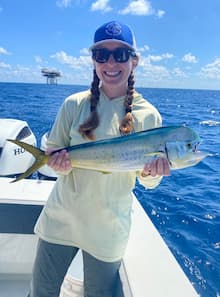
Alexandra Prouse
Ph.D. Student
She/Her/Hers
Project
My research interests include food web ecology and ecotoxicology with an emphasis on marine fishes. Trophic dynamics may influence contaminant body burdens in marine predators, thus impacting these ecologically and economically important species. Perfluoroalkyl substances (PFAS) are a class of contaminants of emerging concern (CECs) that are widespread in the environment and may cause adverse biological or ecological effects. My dissertation utilizes multiple mass spectrometry methods to conduct stable isotope and PFAS analysis, which allows us to investigate variations in these signatures among marine fish species and ocean basins.

Sarah Davis
Ph.D. Student
She/Her/Hers
Project
Hello! Prior to joining the Phytoplankton Dynamics Lab in August 2020, I received a B.S. in Marine Science and Biochemistry at Coastal Carolina University. My current research interests include understanding how emerging pollutants (EPs) impact aquatic ecosystems, specifically regarding their presence and levels in vulnerable systems, determining their impact on primary productivity, and understanding human perception of emerging pollutants. My current project works to identify how EPs impact primary producers by assessing how the emergent pollutant class, perfluorinated alkylated substances (PFASs), impacts phytoplankton physiology and microbial community composition. PFASs have been used ubiquitously by humans and are now found in environments around the world. PFASs can be toxic, bioaccumulate, and are persistent, so it's important to determine their impact on aquatic primary producers which fuel the rest of the aquatic environment.
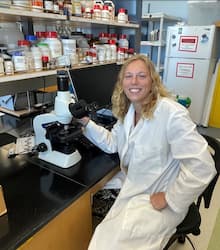
Alyssa Antolak
Ph.D. Student
She/Her/Hers
Hi there! I graduated with my B.S. in Marine Science from Coastal Carolina University in May of 2023, before joining the Phytoplankton Dynamics Lab in August of 2023. My research focuses on quantifying how different environmental and anthropogenic factors impact the biological and chemical composition of marine snow. Marine snow is an aggregation (on average ~500 μm) of organic (algae, bacteria, zooplankton fecal pellets) and inorganic particles that is visible to the naked eye. This project will utilize roller table methodology to create marine snow in a laboratory environment. Experiments will focus on: 1. Quantifying the impact grazers (copepods) have on marine snow production and composition. 2. Quantifying the impact different types/ages of plastic have on marine snow composition, production, and grazing rates. 3. Comparing marine snow production in a coastal vs. open ocean environment. 4. Comparing marine snow production across seasons in Galveston Bay. During each experiment the biological and chemical composition of marine snow will be assessed through a variety of bioassays. Marine snow is an essential component of the biological carbon pump so determining how different factors impact its composition is essential to understand global carbon cycling.

Aurora Gaona Hernández
Ph.D. Student
She/Her/Hers
Hi! I'm a biologist originally from Mexico City and with a B.S. from UNAM. The last 5 years I lived in Ensenada, Baja California, Mexico where I received a M.S. in Marine Ecology from CICESE, and worked for the Gulf of Mexico Research Consortium (CIGOM). I have experience working with marine zooplankton, programming and statistical analysis. I have joined Texas A&M University at Galveston as of Spring 2021 to do my PhD in Marine Biology. My project will be focused on oyster disease ecology and its implications for soft tissue production and shell integrity. I will also perform an historical analysis of an oyster parasite of international concern and its links with water quality and ongoing climate change. I would like to address my future research in the disease ecology of other important foundation species.
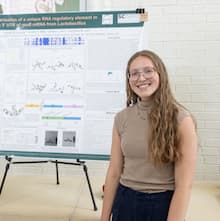
Lauren DeJong
Ph.D. Student
She/Her/Hers
I graduated from Coastal Carolina University with a B.S. in Marine Science in May 2024 and I am currently a PhD student in the Phytoplankton Dynamics Lab. My research interests include phytoplankton population dynamics, the effects of per- and polyfluoroalkyl substances (PFAS) and nano plastics on phytoplankton, and the pathways through which pollutants are transported through food chains. I am passionate about connecting my research to my community by enhancing awareness and understanding of these hard working and vital primary producers.
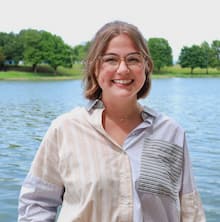
Hope Tucker
Ph.D. Student
She/Her/Hers
Howdy! I graduated from Baylor University with a B.S. in Environmental Sciences with a Chemistry Concentration and a minor in Biology in December of 2024. I am a Ph.D. student in the Phytoplankton Dynamics Lab. My research interests include analyzing the effects of water chemistry, with a particular emphasis on the effects of nutrient stoichiometry and physical properties, such as temperature and salinity, on cyanobacterial and microalgal community behavior.

Delaney Creech
Master’s Student
Hi! Prior to joining the Phytoplankton Dynamics Lab as a M.S. student in August 2025, I graduated from TAMUG with a B.S. in Marine Biology in May 2025. My primary research interests include phytoplankton ecology and harmful algal blooms (HABs). I am specifically interested in how freshwater inflows cause fluctuations in salinity and nutrient composition of an estuary, and how these shifts influence phytoplankton community composition. Ultimately, I would like to explore how changes in community composition influence the initiation and dynamics of harmful algal blooms.
Undergraduate Students
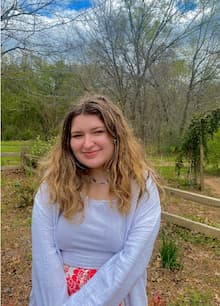
Madeline Sunshine
Undergraduate Student
She/ Her/ Hers
Howdy! My name is Madeline Sunshine and I have been in the Phytoplankton Dynamics lab since the Spring of 2022. I am currently pursuing a Marine Biology and Marine Fisheries double degree with a chemistry minor and plan on graduating in the Spring of 2025. When I started in the lab, I helped to monitor the presence of harmful algal blooms (HABS) through our Imaging FlowCytobot (IFCB) in accordance with Noah Claflin and Texas Parks and Wildlife. As of summer 2024, I am working under the guidance of PhD student Alyssa Antolak, amongst other undergraduates, on a project utilizing mesocosm and roller tank experiments to further understand marine snow aggregations. Through this project, I am conducting my own undergraduate research on the biological efficiency and abundance of phytoplankton communities and marine snow aggregations between a coastal ecosystem and open ocean ecosystems. I will be using the Phyto-PAM machine, an instrument that allows for the calculation of chlorophyll, photosynthetic efficiency, deconvolution of pigmented phytoplankton groups, and many other fluorescence variables, to examine overall biological efficiency of the aggregations. The goal of this research is to expand our understanding of marine snow between two physically different environments in the Gulf of Mexico regarding primary productivity and abundance.
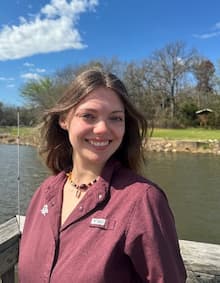
Paris Waters Lockridge
Undergraduate Student
She/ Her/ Hers
Howdy! My name is Paris Waters and I am a senior Marine Biology and Marine Fisheries double degree major with a minor in Diving Technologies and Methods and I am set to graduate in May of 2025. I have previously assisted Noah Claflin with his project focused on relationships between water quality and phytoplankton community structure in Galveston Bay. Specifically, I helped with monitoring for harmful algal blooms with the IFCB (Imaging FlowCytoBot) and maintaining daily chlorophyll-a samples. I am currently performing undergraduate research, under guidance of Alyssa Antolak, by utilizing 16S and 18S rRNA sequencing and the IFCB to determine microbial composition within marine snow aggregations. OMICS is the perfect tool for comparing communities on a large-scale location span and determining the biochemical changes in both marine snow aggregates and surrounding seawater. This project is executed via mesocosm roller-tank experiments to compare phytoplankton communities within coastal and open ocean locations in the Gulf of Mexico. Understanding how biological interactions among communities will impact marine snow particle aggregation and composition, and what events will affect those communities, is fundamental in investigating phytoplankton contribution to carbon sequestration.
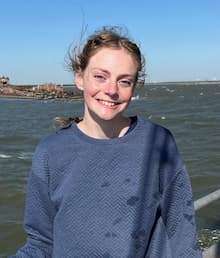
Dylan Buchmiller
Undergraduate Student
Hi! My name is Dylan Buchmiller, and I am a Marine Science major. I graduated with my Associate of Science from Collin College in Dallas, Texas, and transferred here to TAMUG in January 2024. I immediately wanted to immerse myself in the many research opportunities here, especially those involving my passion for phytoplankton, so I quickly joined the Phytoplankton Dynamics Lab. Under Ph.D. student Alyssa Antolak, I am conducting research on how the microstructural components of marine snow are altered based on a pelagic or a coastal location. Specifically, I use staining and microscopy to approximate the area of bacteria, Extracellular Polymeric Substance (EPS), and Transparent Exopolymeric Particles (TEP) in individual marine snow aggregates. We will then compare these values to quantitatively determined EPS and TEP. For this research, I am producing an undergraduate thesis as a TAMUG Undergraduate Research Scholar. Additionally, I volunteer in our lab to monitor Chlorophyll content and HABs in Galveston Bay.
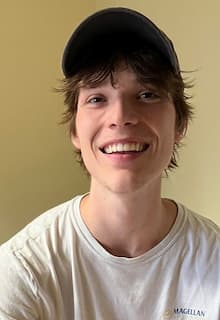
Nick Longmore
Undergraduate Student
Howdy! My name is Nick Longmore, and I'm a Marine Biology major at Texas A&M Galveston. I've recently joined the Phytoplankton Dynamics Lab this semester, where I'll be contributing to research on the cultivation of marine snow, focusing on the differences between coastal and open ocean samples under PhD student Alyssa Antolak. My role involves analyzing the biological and chemical composition of marine snow, examining factors such as biomass, chlorophyll, TEP, EPS, water nutrients, lipids, amino acids, and POC/PON. Additionally, I'll assist with the setup and sampling on the roller tables to facilitate our 18s and 16s omics analysis and enzyme experiments.
Alumni
Grad Students
Noah Claflin
M.S. in Marine Biology, 2023
Thesis title: “A Seven Year Analysis into the Phytoplankton Community of Galveston Bay Using IFCB Imagery”
Dr. Rayna Nolen
Ph.D. in Marine Biology, 2023
Thesis title: “PFASs in Galveston Bay and the Gulf Of Mexico: Water, Biota, and Developing an Exposure Biomarker“
Jessica Hillhouse
M.S. in Marine Biology, 2022 (non-thesis)
Legacy: Everything has a place! Everything has a label!
Jennifer Genzer
M.S. in Marine Biology, 2019
Thesis title: "Potential Impacts of Ocean Acidification on Diatom Aggregation When Exposed to Crude Oil and Chemical Dispersants"
Samantha Setta
M.S. in Marine Biology, 2018
Hannah Preischel Lee
M.S. in Biological Oceanography, 2017
Allyson Lucchese
M.S. in Biological Oceanography, 2017
Thesis title: "Phytoplankton Dynamics in Galveston Bay: Assessing Responses to Freshwater Inflows"
Rachel Windham
M.S. in Marine Resource Management, 2015
Thesis title: "Rangia as Potential Indicators of Bay Health"
Dr. Alicia Shepard
Ph.D. in Biological Oceanography, 2015
Dissertation title: "Responses of Heterotrophic and Autotrophic Pico- and Nano-Plankton to Nutrient Availability and Enrichment across Marine Systems in the Northern Gulf of Mexico"
Dr. Zhao Yan
Ph.D. in Biological Oceanography, 2014
Dissertation title: "Phytoplankton Dynamics in the Northern Gulf of Mexico (NGOM): Field and Laboratory Experiments"
Katherine (Nicki) Laverty
M.S. in Marine Resource Management, 2014 (non-thesis)
Legacy: OCD and green thumbs!
Tyra Booe
M.S. in Marine Resource Management, 2014 (non-thesis)
Legacy: Left the biggest shows to fill!
Dr. Allison McInnes
Ph.D. in Biological Oceanography, 2014
Dissertation title: "Estimation and Fate of New Production in the Marine Environment"
Matthew Gore
M.S. in Marine Biology, 2013
Thesis title: "Growth Rate of Marine Microalgal Species using Sodium Bicarbonate for Biofuels"
Dr. Jamie Steichen
Ph.D. in Biological Oceanography, 2013
Dissertation title: "Ecosystem under Pressure: Examining the Phytoplankton Community in the High Ballast Water Discharge Environment of Galveston Bay, Texas (USA)"
Samuel Dorado
M.S. in Marine Biology, 2011
Thesis title: "Coastal and Marine Nitrogen Sources Shift Isotopic Baselines in Pelagic Food Webs of the Gulf of Mexico"
Leslie Rulon
M.S. in Marine Resource Management, 2010
Thesis title: "Effects of Nutrient Additions on Three Coastal Salt Marsh Plants Found in Sunset Cove, Texas"
Elizabeth Neyland
M.S. in Biology, 2009
Amanda Thronson
M.S. in Biology, 2008
Thesis title: "Effect of variation in freshwater inflow on phytoplankton productivity and community composition in galveston bay, texas"
Linda Roehrborn
M.S. in Biological Oceanography, 2006
Thesis title: "Seasonal analysis of abiotic factors impacting phytoplankton assemblages in Offatts Bayou, Galveston, Texas"
Postdoctoral Fellows
Dr. Laura Bretherton (2016-2018)
Now Post –doctoral fellow, Dalhousie University, Canada
Laura Bretherton's Google Scholar
Dr. Manoj Kamalanathan (2016-2022)
Now Senior Research Scientist, Bigelow Laboratory for Ocean Sciences, Maine
Manoj Kamalanathan's Google Scholar
Dr. Hernando Bacosa (2017-2018)
Now Environmental Science Program at Mindanao State University, Philippines
Hernando Bacosa's Google Scholar
Dr. Alicia Williams (2015-2016)
Now Instructional Assistant Professor at University of New England, Maine
Google Scholar of Alicia Williams
Dr. Erin Kinney (2011-2013) (co-advised with Anna Armitage)
Now Senior Research Scientist, Houston Advanced Research Center, Houston
https://harcresearch.org/people/erin-kinney-phd/
Dr. Yuelu Jiang (2010-2013) (co-advised with Peter Santschi)
Now Associate Professor, Tsinghua University, China
Dr. Eric Madrid (2009-2011) (co-advised with Anna Armitage)
Now Assistant Professor, Northwest Vista College, San Antonio
Dr. Chuan-Kai Ho (2008-2011) (co-advised with Anna Armitage)
Now Assistant Professor, National Taiwan University
Dr. Angela Capper (2008-2009)
Now Research Fellow, CQ University, Australia
Angela Capper's Google Scholar
Dr. Miao Aijin (2006-2009) (co-advised with Peter Santschi)
Now Associate Professor, Nanjing University, China
Staff
*See also Tyra Booe, Rachel Windham and Jessica Hillhouse in student section
Kendra Dean
Now Adjunct Faculty, University of Minnesota
Legacy: Advocate for educational outreach
Amelia McAmis
Now Account Manager for Chemsearch FE
Legacy: Machine Whisperer, Phyto Identification Queen
Jola (Agaj) Brown
Now Synthetic Genomics
Legacy: Chemist, Making biofuels
Louis Brown
Now Director of Phototrophic Production, Synthetic Genomics
Legacy: Visionary from bottle to outdoor ponds, Making biofuels
Federico Alvarez
Now Fugro, Houston
Legacy: Stowaway! Participated in over 100 days of research cruises in the Gulf of Mexico as an undergraduate and graduate student
Undergraduate Students (only listing UG Research Scholars here)
Dylan Buckmiller
B.S. in Marine Sciences, 2025
Thesis title: "Thesis title: Biological Snowfall: Analyzing Marine Snow Microstructure and composition."
Christopher Pryor
B.S. in Marine Sciences, 2024
Thesis title: "PFAS Mixology: The physiological response of Texas coastal phytoplankton to perfluoroalkyl substances."
Shaley Klumker
B.S. in Marine Biology and Marine Fisheries, 2022
Thesis title: "Perfluorooctane sulfonate and natural phytoplankton communities: pollutant insight from the base of aquatic food webs."
Jake Ballard
B.S. in Marine Biology, 2022
Thesis title: "Describing the Impacts of Wastewater Effluent on the Phytoplankton Community Composition in Galveston Bay”
Alexandra Yard
B.S. in Marine Sciences, 2020
Thesis title: "The Toxicity of Weathered Oil on an Oil Resistant Diatom Species.”
Savannah Mapes
B.S. in Marine Biology, 2019
Thesis title: "The effect of oil and dispersant on the growth, physiology and brevetoxin production by marine dinoflagellate Karenia brevis."
Michelle Nguyen
B.S. in Marine Biology, 2018
Thesis title: " The Effects of Crude Oil on the Marine Diatom, Phaeodactylum tricornutum, Grown in Silica-Enriched and Silica-Limited Conditions."
Amelia McAmis
B.S. in Marine Biology, 2017
Thesis title: “Diversity and Abundance Changes of Diatoms Due to Seasonal Temperature and Salinity Variations in Galveston Bay.”
Marti Nunez
B.S. in Marine Sciences, 2013
Thesis title: “The changes in growth and composition of marine microalgae in response to sodium bicarbonate and nitrogen”.
Allison Skinner
B.S. in Marine Biology, 2007
Thesis title: “Belly-up in the bayou, who’s the culprit? Physical, chemical and biological parameters of Offatts Bayou, Galveston, TX”.